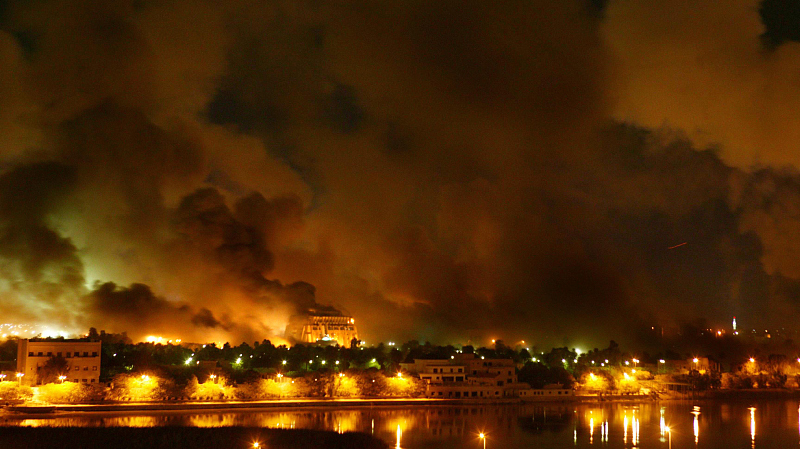
Explosions and Iraqi anti-aircraft fire light the sky during the third night of the U.S. shelling of Baghdad, Iraq, March 22, 2003. /CFP
Explosions and Iraqi anti-aircraft fire light the sky during the third night of the U.S. shelling of Baghdad, Iraq, March 22, 2003. /CFP
The lesson of the U.S.-led Iraq war, which brought disaster to Iraq and the Middle East region, is extremely profound. It deserves deep reflection by the U.S. side and serves as a wake-up call to the world, the Chinese Foreign Ministry said on Monday.
According to research by the Watson Institute for International and Public Affairs at Brown University, between 185,000 and 208,000 Iraqi civilians have been killed since the U.S. launched the Iraq war in 2003 without a significant cause. Tens of millions more have also been affected by the nightmarish chaos and post-war trauma.
Wang said the U.S. provoked the war in Iraq to realize its geopolitical purposes, which inflicted heavy costs on the region and the world. The war also fully exposed the true face and great harm of U.S. hegemony. So the world must join hands, resolutely resist hegemony and stop any attempt to tread on other countries' sovereignty and deprive of other countries' development right through bullying, he said.
He also called on the international community to earnestly uphold the international system with the United Nations at its core and observe basic norms governing international relations, saying only by doing this can the strong bullying the weak and the big bullying the small be stopped.
"Facts have proved that talk of a 'rules-based international order' without regard to the UN and the international law is nothing but an excuse for the law of the jungle," Wang said.
He stressed the importance of countries' right to explore their democratic system and development path, saying a country's democratic system and development path cannot be imposed from the outside and must be explored and developed by its people. It is precisely anti-democratic to promote one's own model of democracy in the name of democracy, Wang noted.
"What is worrying is that the U.S. has clearly not learned the lessons of the Iraq war. The country has been involved in the conflicts in Libya and Syria since then and is still selling American democracy," Wang said, "It's reasonable to ask who will pay for the next 20 costly years of U.S. hegemony."